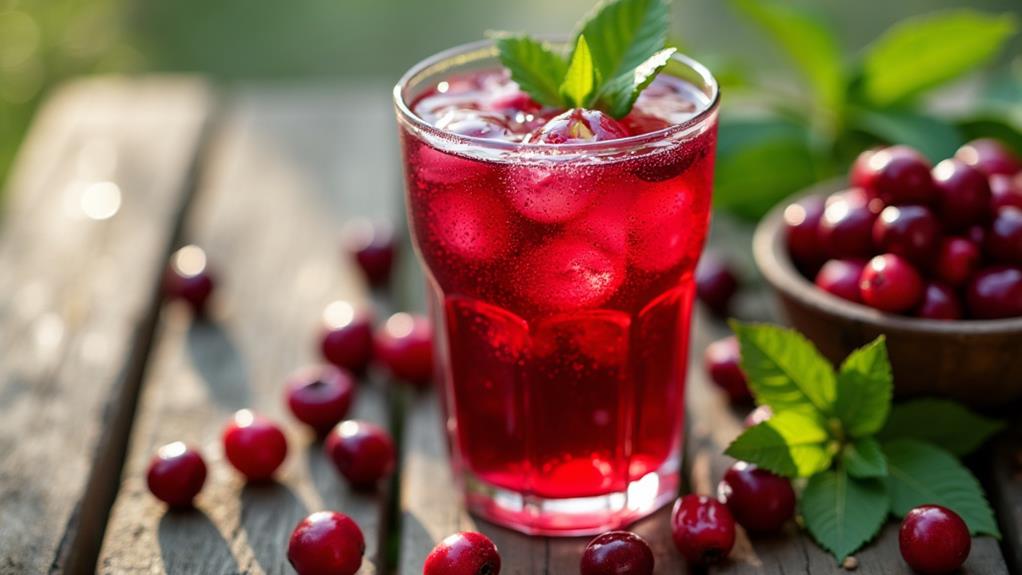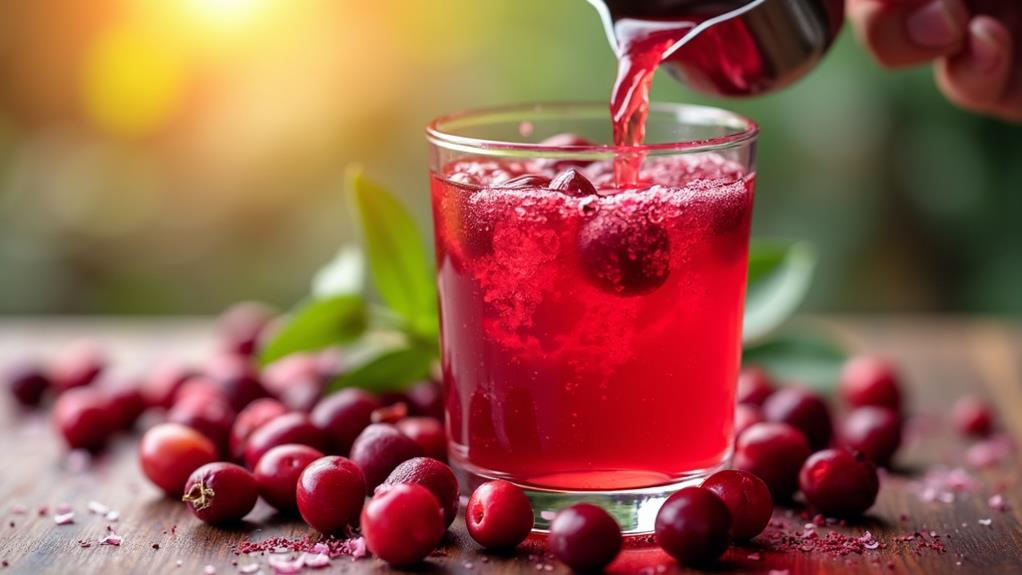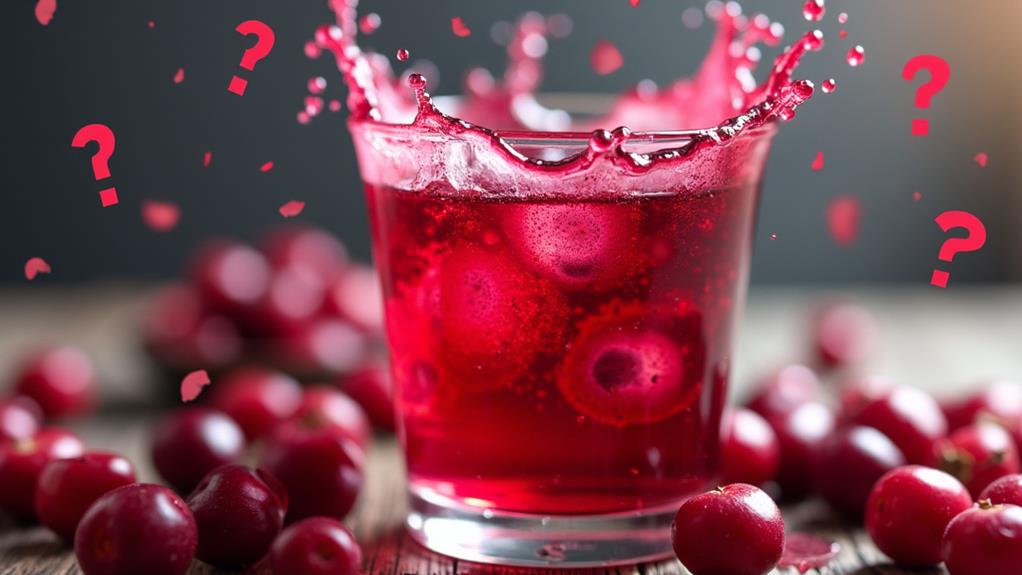Cranberry Juice: A Tart and Powerful Drink for Urinary Health

You can tap into the tart benefits of cranberry juice to support your urinary health. The juice contains proanthocyanidins (PACs) that help prevent bacteria like E. coli from sticking to your bladder, reducing the risk of urinary tract infections (UTIs). Drinking 100% cranberry juice daily can complement other preventive measures, lowering UTI frequency over time. Be mindful of its high oxalate content, which may raise kidney stone risk, and avoid sugared versions to maintain its health benefits. Consider checking in with your healthcare provider, and as you investigate more, uncover other ways cranberry juice can improve your well-being.
Research on Cranberry Juice
Although cranberry juice has long been touted for its potential health benefits, research provides a clearer picture of its role in urinary health. If you're concerned about urinary tract infections (UTIs), cranberry juice might be worth considering. Studies show that the proanthocyanidin (PAC) content in cranberry juice helps prevent bacteria like E. coli from adhering to the bladder lining. This can reduce the risk of developing UTIs, especially for women prone to frequent UTIs and children.
A meta-analysis of 10 studies highlights that cranberry products, including juice, can notably protect against UTIs. Clinical trials reveal that drinking 8 oz of cranberry juice daily for 24 weeks can lead to fewer UTI episodes. While the results can vary depending on individual health conditions, some research suggests that cranberry juice may lower the frequency of UTIs over a year.
It's crucial to understand that cranberry juice isn't a substitute for antibiotics when treating existing UTIs. However, it serves as a complementary preventive measure you can incorporate into your routine. By regularly consuming cranberry juice, you might find it easier to manage and potentially reduce the occurrence of UTIs.
Health Benefits and Risks
While cranberry juice offers potential benefits for urinary health, it is vital to be aware of the associated risks. Cranberry juice contains proanthocyanidins (PACs), which are believed to help prevent bacteria, like E. coli, from adhering to the bladder lining. This can potentially reduce the risk of urinary tract infections (UTIs) and serve as a prevention measure. Studies have shown that women who consume 8 ounces of cranberry juice daily for 24 weeks might experience fewer UTI episodes, highlighting these health benefits.
However, not all cranberry products are created equal. It is important to choose 100% cranberry juice without added sugars to enhance its efficacy. In addition, cranberry juice is high in oxalates, compounds that could increase the risk of kidney stones. If you're prone to kidney stones, you might want to rethink how much cranberry juice you consume.
There are also potential interactions to take into account. If you're taking warfarin, an anticoagulant, cranberry juice can increase the risk of bleeding. Furthermore, individuals with interstitial cystitis may find that cranberry juice exacerbates their symptoms. Thus, while cranberry juice can be a powerful ally in urinary health, it is significant to weigh these risks carefully.
Recommended Consumption

Guidance on consuming cranberry juice for urinary health emphasizes moderation and quality. To help prevent urinary tract infections, a daily intake of 8 to 10 oz of cranberry juice is suggested. This routine can support UTI prevention, as studies show women who drank 8 oz for 24 weeks experienced fewer UTIs. However, make certain you're consuming 100% cranberry juice without added sugars to maintain its health benefits. Sweetened versions can negate the positive effects, making it essential to choose your juice wisely for optimizing urinary tract health.
Here's a strategic approach to incorporating cranberry juice and supplements effectively:
- Select Quality Products: Opt for 100% cranberry juice and consider cranberry supplements that contain at least 36 mg of proanthocyanidins (PAC) for efficacy.
- Maintain Regular Consumption: Incorporating cranberry juice consistently can contribute to improved urinary tract health, but remember it should complement other preventive measures.
- Consult a Healthcare Provider: Before starting any cranberry products, especially if you're on medications like warfarin or have specific health conditions, seek advice from a healthcare provider.
UTI Prevention Tips
Preventing urinary tract infections (UTIs) involves a combination of smart habits and lifestyle choices. One effective strategy is to drink cranberry juice regularly. Consuming 8 to 10 ounces of 100% cranberry juice daily can help reduce the recurrence of UTIs. The secret lies in Proanthocyanidins (PAC) found in cranberries, which prevent bacteria from sticking to the bladder wall, reducing your UTI risk.
Staying hydrated is another vital factor. Aim to consume 2 to 4 liters of water daily. This helps flush out bacteria from your urinary tract, lowering the chances of infection. Furthermore, urinate immediately after sexual intercourse to eliminate any bacteria that might have entered your urinary tract, further preventing UTIs.
Don't overlook proper hygiene practices, either. Always wipe from front to back to avoid spreading bacteria and wear breathable cotton underwear to minimize moisture, creating a less hospitable environment for bacterial growth.
Common Misconceptions

Cranberry juice plays a significant role in preventing UTIs, but it's surrounded by several misconceptions that need addressing. Many believe cranberry juice can treat existing urinary tract infections (UTIs). However, it's more effective at preventing UTIs rather than treating them. Understanding the truth behind cranberry products can help you make informed choices.
- Cranberry Products Vary: Not all cranberry products are similarly effective. The concentration of proanthocyanidins (PAC) in cranberry juice and supplements determines their efficacy. Higher PAC levels are more likely to prevent UTIs by inhibiting bacterial adhesion to the urinary tract walls.
- Mixed Results for Recurring UTIs: Some people assume cranberry juice is a guaranteed solution for UTIs. However, studies show mixed results, especially among women with recurring UTIs. It's crucial to view cranberry juice as part of a broader strategy, not a standalone solution.
- Safety Concerns: While generally safe, cranberry juice can worsen symptoms for those with interstitial cystitis and may interact with blood-thinning medications, increasing bleeding risks. Always seek medical advice if you're considering cranberry supplements, especially if you're on medications or have underlying health conditions.




